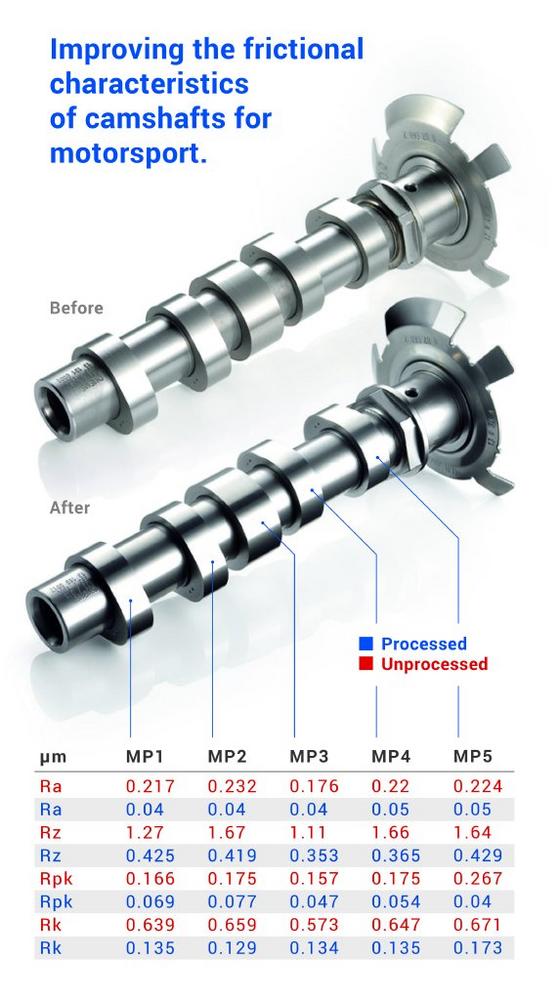As an international technology leader in mass finishing, OTEC designs and builds systems that reduce friction between components, benefiting both the premium car segment and motorsport. The heat, stresses and material abrasion caused by friction are detrimental to the precision and service life of all components. Lower friction means less wear, smoother power delivery and better energy consumption. The aim is always to minimise the influence of friction on the system as far as possible.
OTEC machines are the answer, with innovative processing specially optimised for every application. During surface processing of camshafts and gears, for example, all sharp tips are rounded, preventing chip formation.
In general, OTEC finishing enables the so-called third body to be formed more quickly between two surfaces in friction. This is the boundary layer where the surfaces, which are separated by a thin oil film, transfer their kinetic energy to each other. This flexing action makes the crystalline nanostructure of the layer extremely fine with a pasty viscosity, reducing friction.
This eliminates the need for lengthy running-in of engines and gearboxes, which reduces oil contamination and extends oil change intervals by up to 100%. An additional benefit is the 10% reduction in heat generated and up to 50% less noise emissions compared to conventionally ground parts.
Another advantage is the decrease in micropitting with gear wheels where the lubricating film breaks through at localised points causing mixed friction and excess pressure. This wear causes flattening at the contact point. The most important individual parameter is the surface roughness. Values below 0.2 Ra, which OTEC finishing typically achieves, can significantly reduce micropitting.
With weight optimisation being a critical factor not only in motorsport or the premium car segment, new technologies such as electric mobility also present developers with major challenges. New shapes and materials sometimes require completely new manufacturing processes, that in turn need innovative solutions for surface finishing.
Selective Laser Melting (SLM), for example, is a relatively new generative manufacturing process. The workpiece is built up with metal powder layer by layer using a laser. Smaller components such as engine valves can therefore be constructed with an internal honeycomb structure, saving significant weight without impairing functionality. However, the surface roughness that can be achieved by this manufacturing process clearly exceeds the expectations of modern production processes.
OTEC’s machine and process technology solves this problem. Depending on the application, multi-stage processing uses various abrasive grinding media that are already proven for preparing the cutting edge of tools, deburring, smoothing and polishing tools, removing droplets on the chip groove, and so on.
OTEC has developed the PULSFINISH process especially for integration into mass production lines. The clamped workpiece is immersed in the media flow of the rotating container and accelerated to over 2,000 rpm in a very short time. Within 0.5 seconds, the workpiece in the media is increased to maximum tangential acceleration and deceleration back to zero, producing relative speeds of up to 30 m/s and accelerations of up to 40 G.
The benefit is the extremely short process times: our mass finishing process is probably the fastest – even for complex parts such as worm shafts, gear wheels or camshafts. These can be deburred, rounded, smoothed and polished in seconds, making it easy to integrate the machine into any production cycle.
Mass finishing with the PULSFINISH process not only removes grinding marks and reduces the roughness parameters to values significantly below 0.1 µm, but also creates microcavities. These collect the lubricating oil, which is not displaced on contact as it is with conventional grinding grooves. Extensive tests have shown that uniform, smooth surfaces with microcavities and low Rpk values generate the least wear and reduce friction losses.
OTEC Präzisionsfinish GmbH offers precise technology for perfect surface finish. OTEC machines for deburring, grinding, smoothing and polishing guarantee an efficient and perfect surface finish of tools and products. Operating a worldwide distribution network, OTEC is represented locally for international customers from various industries. Thousands of customers benefit from the extensive know-how of the technology leader OTEC in the development of a perfected interplay of machine and process media.
OTEC Präzisionsfinish GmbH
Heinrich-Hertz-Straße 24
75334 Straubenhardt
Telefon: +49 (7082) 4911-20
Telefax: +49 (7082) 4911-29
http://www.otec.de
Marketing
Telefon: +49 (7082) 49112-0
Fax: +49 (7082) 49112-9
E-Mail: a.bauer@otec.de
![]()
